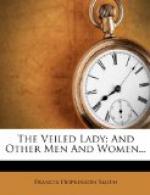“’You were so dead easy there warn’t no fun in it. I dropped to that the first time you opened your head, but Sam had picked you out and it had to go at that. My wife saw his mistake as soon as she got her eyes on you, but Sam, like a fool, wouldn’t listen. He was to do the picking, and so I couldn’t say a word. When we all got outside, clear, we took a turn around Washington Square so I could have my laugh out on Sam, and when we got back you were gone and so was the fellow from Boston who chipped in, and so was that red-headed Irish waiter. That knocked us silly—wife gave us rats, and I felt like a yellow dog. Been a-feeling so ever since. The Dago couldn’t or wouldn’t understand. Said we’d better come in when the boss was there. We had to take the eleven o’clock to Boston that night and had only time to catch the train. When I got back at six-ten to-night I drove to Foscari’s, found the Irishman and the boss, heard how he’d pulled your leg—paid the bill—$9.60, wasn’t it?—that’s what he said it was, anyhow—and here’s your picture!’
“I had dropped the poker now and was motioning him to a chair.
“’No, thank you, I won’t sit down; ain’t got time. Got to take the eleven forty-five for Chicago. Well, we had a lot of fun out of it, anyhow, only I didn’t intend it should end up the way it did. Just wanted to get even with Sam and win my bet.’
“’Bet? I asked. I was still in the dark as to what he meant.
“’Yes—bet Sam I’d bunco any New York man he’d pick out, and you happened to be the one. You see, wife and I and Sam were here for a few days and we struck Thanksgiving and wanted some fun, and we had it. You’re white, old man all the way through —white as cotton and our kind—never flunked once, or turned a hair. Sally took an awful shine to you. Shake! Next time I’m in New York I’ll look you up and if you ever come out our way we’ll open a keg o’ nails, and make it red-hot for you, and don’t you forget it. Here’s my card, so you can remember.’”
Peter picked up the card from the table, threw up his chin, and broke into one of his infectious laughs. I reached over and took it from his hand. It bore this inscription:
J. C. Murphy
General Travelling Agent
C. S. & Q. R. R.
OGDEN, UTAH
MISS JENNINGS’S COMPANION
The big Liner slowed down and dropped anchor inside the Breakwater. Sweeping toward her, pushing the white foam in long lines from her bow, her flag of black smoke trailing behind, came the company’s tender—out from Cherbourg with passengers.
Under the big Liner’s upper deck, along its top rail, was strung a row of heads watching the tender’s approach—old heads—young heads—middle-aged heads—Miss Jennings’s among these last—their eyes taking in the grim Breakwater with its beacon light, the frowning casemates specked with sentinels, and the line of the distant city blurred with masts and spent steam. They saw, too, from their height (they could look down the tender’s smokestack) the sturdy figure of her Captain, his white cap in relief against the green sea, and below him the flat mass of people, their upturned faces so many pats of color on a dark canvas.




